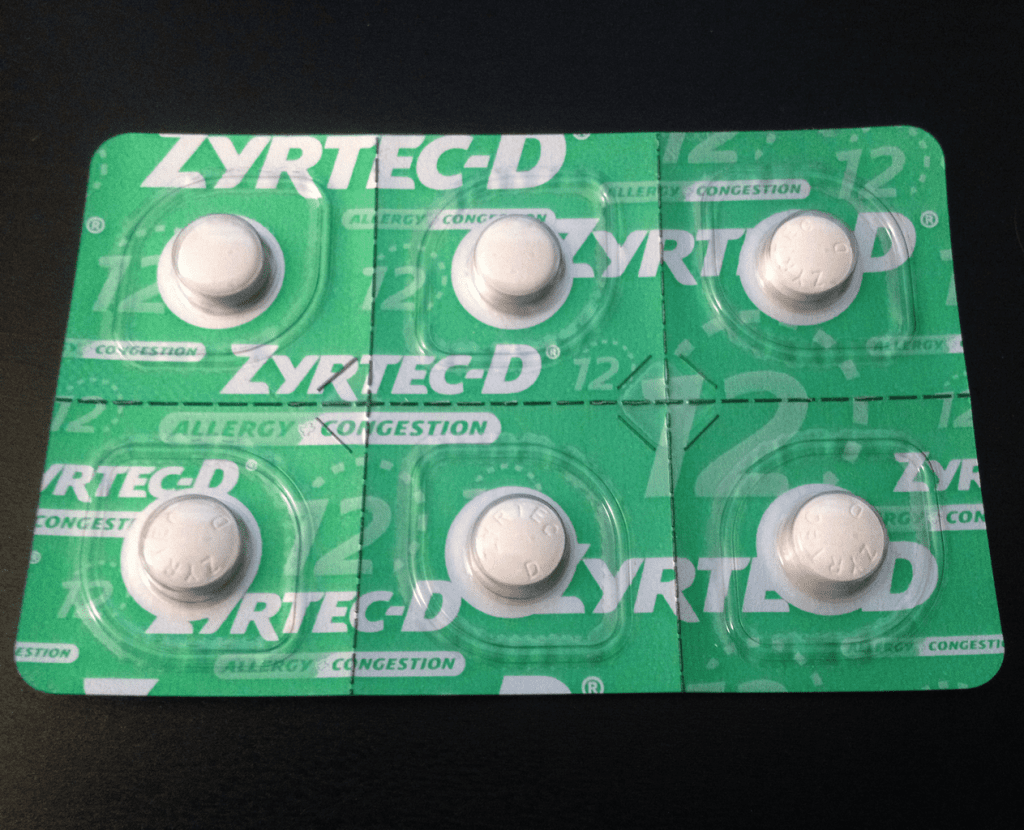If you’re like most dog owners, you want to do whatever you can to keep your furry friend healthy and happy. That’s why it’s important to know the right dosage of Zyrtec for dogs.
In this blog post, we will discuss the recommended dosage for dogs, as well as some potential side effects of Zyrtec. Keep reading to learn more!
- Key Takeaway
- What Is Zyrtec?
- How Much Zyrtec Can I Give My Dog? Dosage for Dogs
- How Often Can I Give My Dog Zyrtec?
- Will Zyrtec Help My Dogs’ Itching?
- What Are The Benefits of Zyrtec For Dogs?
- Are There Alternatives To Zyrtec For Dogs?
- FAQs
- Q: Can I give my dog Zyrtec?
- Q: How does Zyrtec work in dogs?
- Q: Can I give Zyrtec to my dog every 24 hours?
- Q: How do I determine the correct dosage of Zyrtec for my dog?
- Q: Is Zyrtec safe and effective for dogs?
- Q: Can pregnant dogs be given Zyrtec?
- Q: Are there any side effects of giving Zyrtec to dogs?
- In Conclusion
Key Takeaway
- Zyrtec is an over-the-counter antihistamine medication used to relieve symptoms of seasonal allergies and hives, such as sneezing, runny nose, itching, and watery eyes.
- The recommended dosage of Zyrtec (Cetirizine) for dogs is approximately 0.5 mg per pound of body weight, given orally once to twice daily, not exceeding 20 mg per dose.
- Zyrtec (Cetirizine) can be given to dogs once to twice daily, with the dosage being approximately 0.5 mg per pound of body weight, not exceeding 20 mg per dose.
What Is Zyrtec?

Zyrtec is an antihistamine that is used to treat allergies in dogs. It can be used to treat both seasonal and non-seasonal allergies. Zyrtec can also be used to treat skin allergies, such as those caused by flea bites. Zyrtec works by blocking the action of histamine.
Histamine is a substance that is released by the body in response to an allergic trigger. When histamine binds to receptors on cells, it causes the cells to release chemicals that cause allergy symptoms. By blocking histamine, Zyrtec prevents these symptoms from occurring.
Zyrtec works by blocking histamines that are produced by the body in response to an allergen. This action helps to relieve symptoms such as sneezing, runny nose, watery eyes, and itching. Zyrtec is most effective when taken at least 30 minutes before exposure to an allergen.
The most common side effect of Zyrtec is drowsiness. Other side effects may include dry mouth, stomach upset, and diarrhea. Zyrtec should not be used in dogs who are pregnant or nursing. It should also not be used in dogs with certain medical conditions, such as liver disease. Zyrtec is available by prescription from your veterinarian.
Zyrtec can be used to provide relief for your dog’s allergies, just as it does for humans. Allergies in dogs can cause a number of uncomfortable symptoms like itchiness, excessive licking, and red or watery eyes. If your dog is experiencing any of these symptoms, Zyrtec can help to provide relief.
In addition, Zyrtec can also be used to help relieve symptoms associated with seasonal allergies like pollen and grass. So if you’re looking for a way to help your furry friend feel better during allergy season, Zyrtec may be the answer.
How Much Zyrtec Can I Give My Dog? Dosage for Dogs

Recommended Zyrtec dosage for dogs is 0.5 mg per pound, once or twice a day, but not to exceed 20 mg in 24 hours. Zyrtec comes in five and ten-milligram tablets, so you might need a pill cutter in order to give your dog the proper dosage.
| Medicine | Dog Weight | Daily Dosage | Frequency |
| Zyrtec | 5 lbs | 2.5 mg | Once (evening) |
| Zyrtec | 10 lbs | 5 mg | Once (evening) |
| Zyrtec | 15 lbs | 7.5 mg | Once (evening) |
| Zyrtec | 20 lbs | 10 mg | Once (evening) |
| Zyrtec | 25 lbs | 12.5 mg | Once (evening) |
| Zyrtec | 30 lbs | 15 mg | Once (evening) |
| Zyrtec | 35 lbs | 17.5 mg | Once (evening) |
| Zyrtec | 40 lbs | 20 mg | Once (evening) |
| Zyrtec | 45 lbs | 20 mg | Once (evening) |
| Zyrtec | 50 lbs | 20 mg | Once (evening) |
| Zyrtec | 55 lbs | 20 mg | Once (evening) |
| Zyrtec | 60 lbs | 20 mg | Once (evening) |
| Zyrtec | 65 lbs | 20 mg | Once (evening) |
| Zyrtec | 70 lbs | 20 mg | Once (evening) |
| Zyrtec | 75 lbs | 20 mg | Once (evening) |
| Zyrtec | 80 lbs | 20 mg | Once (evening) |
| Zyrtec | 85 lbs | 20 mg | Once (evening) |
| Zyrtec | 90 lbs | 20 mg | Once (evening) |
| Zyrtec | 95 lbs | 20 mg | Once (evening) |
| Zyrtec | 100 lbs | 20 mg | Once (evening) |
| Zyrtec | 100+ lbs | 20 mg | Once (evening) |
Zyrtec typically starts working within 30 minutes and provides 24 hours of relief from allergies for your dog.
Zyrtec is an antihistamine that can be used to relieve allergy symptoms in dogs. It works by blocking histamine receptors, which reduces the amount of histamine that is produced in the body.
Histamine is a substance that is released during an allergic reaction and can cause itching, redness, and swelling. Zyrtec can be given to dogs orally or topically, and the dosage will depend on the size of the dog.
It is important to give the proper dosage of Zyrtec to your dog because too much of the medication can cause side effects such as drowsiness, dry mouth, and vomiting.
How Often Can I Give My Dog Zyrtec?
Zyrtec is a medication that is used to treat allergies in humans. It can also be used for dogs who suffer from allergies. The recommended dosage for dogs is 0.5 mg per pound of body weight.
This means that a 50-pound dog would need 20 mg of Zyrtec every day. Zyrtec can be given to the dog either once or twice a day, depending on the severity of the allergies but not to exceed 20 milligrams per day.
Zyrtec can be given to dogs once or twice a day, depending on the severity of the allergy. However, the most you can give your dog is 20 milligrams of Zyrtec in a 24 hour period.
It is important to note that Zyrtec should not be given to puppies who are younger than 12 weeks old. Additionally, pregnant or nursing dogs should not take Zyrtec.
You can give your dog Zyrtec either once or twice a day. The usual dose is 0.50mg/lb once daily or 0.25mg/lb twice daily. Give it to your dog with food to reduce the chances of an upset stomach. If you’re using chewable tablets, make sure your dog chews them thoroughly before swallowing.
In most cases, Zyrtec is a safe and effective medication for dogs who suffer from allergies. However, as with any medication, there are potential side effects that could occur. The most common side effects of Zyrtec in dogs include drowsiness and dry mouth.
In rare cases, more serious side effects may occur, such as vomiting or diarrhea. If you notice any of these side effects in your dog after giving them Zyrtec, it is best to consult with a veterinarian right away.
Will Zyrtec Help My Dogs’ Itching?

Yes. Zyrtec is an antihistamine that can be used to help relieve your dogs’ itching. It works by blocking histamines, which are the chemicals that cause allergic reactions. Zyrtec is available in both tablet and liquid form, and it can be given to dogs older than 12 weeks.
There are a few reasons why dogs may itch due to allergies. One reason is that they may be allergic to something in their environment, such as pollen or mold. Another reason is that they may be allergic to something in their food.
Lastly, some dogs are simply born with sensitive skin that is prone to allergies. Regardless of the cause, itchy skin can be very uncomfortable for your dog and can lead to other problems if not treated properly.
Zyrtec (cetirizine) is a second-generation antihistamine that works by blocking histamine receptors. Histamines are responsible for many allergy symptoms, such as itching, runny nose, and sneezing. Zyrtec is available over the counter in tablet form and is also flavored to make it easier to give to your dog.
Even though you don’t need a prescription from a veterinarian for Zyrtec, there are a few things to consider before giving it to your dog.
First, check with your veterinarian to make sure that Zyrtec is appropriate for your dog’s allergies. Second, be aware that Zyrtec can cause drowsiness in some dogs. If you’re considering giving your dog Zyrtec, talk to your vet about the best way to do it. Third, remember that Zyrtec is not a cure-all for allergies; it’s simply a way to help manage them.
What Are The Benefits of Zyrtec For Dogs?
- Zyrtec, an over-the-counter human allergy medication, is sometimes given to dogs with atopic dermatitis or mild to moderate environmental allergies, providing relief from such conditions.
- By blocking histamine receptors, Zyrtec helps to reduce itching and inflammation in dogs suffering from skin allergies.
- Zyrtec is generally regarded as safe for most dogs, especially those without underlying medical conditions.
- Zyrtec is effective in combating signs of atopy in dogs when given at the proper dosage.
- Zyrtec can help control pet allergy symptoms, starting to work from hour one after administration.
- Studies have shown cetirizine (Zyrtec) to be effective in significantly reducing histamine-, bradykinin-, and allergen-induced wheal and flare reactions.
- Veterinarians may prescribe Zyrtec to treat issues including itchy skin, insect bites, and hives in dogs.
- Zyrtec does not cross the blood-brain barrier in dogs, making sedative effects far less likely.
Are There Alternatives To Zyrtec For Dogs?
- Benadryl (Diphenhydramine): An over-the-counter antihistamine often used to treat allergy symptoms in dogs.
- Claritin (Loratadine): Another non-prescription antihistamine that can be used to treat allergies in dogs.
- Apoquel (oclacitinib): A prescription medication that specifically targets the cause of itch and inflammation in dogs.
- Cytopoint: A veterinary-prescribed injectable treatment that provides long-term relief from chronic itch in dogs.
- Atopica (Cyclosporine): This is a prescription medication used to control atopic dermatitis and other allergic skin conditions in dogs.
- Steroids: In severe cases, veterinarians may prescribe corticosteroids to reduce inflammation and itching.
- Natural remedies: Some pet owners opt for natural alternatives like omega-3 fatty acids, quercetin, or other supplements to support skin health.
- Allergy shots (Immunotherapy): This is a more long-term solution that involves exposing the dog to small amounts of the allergen over time to build up immunity.
- Fatty Acid Supplements: These are often used to help improve skin health and reduce inflammation.
Remember, it’s important to consult with a veterinarian before starting any new medication or supplement regimen for your pet.
FAQs
Q: Can I give my dog Zyrtec?
A: Yes, Zyrtec can be given to dogs. It is commonly used to treat allergies and allergic reactions in dogs. However, it is important to consult with your veterinarian before giving any medication to your dog.
Q: How does Zyrtec work in dogs?
A: Zyrtec works by blocking the action of histamine, which is a substance in the body that causes allergic reactions. By blocking histamine, Zyrtec helps reduce the symptoms of allergies in dogs.
Q: Can I give Zyrtec to my dog every 24 hours?
A: Yes, Zyrtec can be given to dogs every 24 hours. It is important to follow the recommended dosage and consult with your veterinarian for any specific instructions.
Q: How do I determine the correct dosage of Zyrtec for my dog?
A: The correct dosage of Zyrtec for your dog will depend on their size and weight. It is recommended to give 0.5 mg to 1.25 mg of Zyrtec per pound of body weight. It is best to consult with your veterinarian for an accurate dosage calculation.
Q: Is Zyrtec safe and effective for dogs?
A: Yes, Zyrtec is considered safe and effective for dogs when given in the appropriate dosage. However, it is important to consult with your veterinarian before administering any medication to your dog.
Q: Can pregnant dogs be given Zyrtec?
A: It is best to avoid giving Zyrtec or any other medication to pregnant dogs without consulting with a veterinarian. They will be able to provide guidance based on the specific needs of the pregnant dog.
Q: Are there any side effects of giving Zyrtec to dogs?
A: While Zyrtec is generally well-tolerated by dogs, there may be some potential side effects, such as drowsiness, diarrhea, or vomiting. If you notice any unusual symptoms after giving Zyrtec to your dog, it is important to contact your veterinarian.
In Conclusion
In conclusion, Zyrtec can be a beneficial medication for dogs suffering from certain allergic reactions or skin conditions.
It’s typically administered once to twice daily, at a dosage of about 0.5 mg per pound of body weight, with a maximum dose of 20 mg.
However, it’s crucial to remember that every dog is unique and may react differently to medications.




